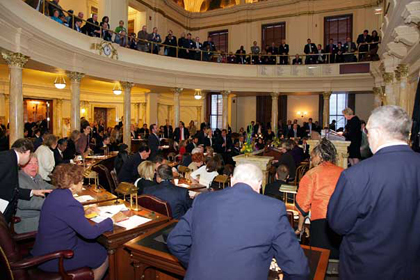
Measure Will Allow Ratepayers to Access Written Policy Decisions on the Internet
TRENTON – A bill sponsored by Senators Loretta Weinberg and Paul Sarlo which requires the Board of Public Utilities (BPU) to issue all orders in writing, and to post those orders on the Internet, was signed into law today.
“In government, as in all things, knowledge is power,” said Senator Weinberg, D-Bergen. “When it comes to BPU decisions which have the potential to affect ratepayers’ utility costs, these decisions should be in writing, and should be easily accessible on the Internet. This new law will ensure that New Jerseyans have transparency when it comes to the regulatory process followed by the State’s utility overseers.”
“The cost of utilities is one of the main cost drivers contributing to the high cost of living in New Jersey,” said Senator Sarlo, D-Bergen, Essex and Passaic. “At a time when utility ratepayers are struggling, and with information so easily available on the Internet, there’s simply no reason why we wouldn’t require BPU orders to be posted on the World Wide Web. Through this legislation, we’re bringing rate regulation into the 21st century, and allowing New Jersey residents to access the information they need to know about their home utility bills.”
The new law, S-2441, requires the BPU to issue most policy and regulatory decisions – typically done through the adoption of an order following a majority vote of the Board’s five commissioners – in written form. Under the measure, the Board will still be permitted to orally issue a temporary order if it deals with a matter of emergency that affects public health and safety, so long as the Board then adopts a subsequent permanent order in written form. Finally, the measure requires that the Board post all orders on its Internet Web site.
In the past, the vast majority of BPU orders were memorialized in written form, with the exception being when a written order was not required or duplicative. An example would be when the Board issues an order to approve a contract – in that instance, the contract operates as the functional equivalent of a Board order.
“While BPU has done a pretty good job at documenting policy decisions, there’s been a lack of consistency in the rules from one decision to the next, and they haven’t been easily accessible by members of the general public,” said Senator Sarlo. “By requiring BPU to put everything in writing, we’re treating the agency like the governmental organization that it is, and by making things available on the Internet, we’re allowing ratepayers to review decisions which will impact their bottom line.”
“Through this new law, we will make sure that BPU follows the same rules of transparency and accountability that apply to all levels of government in New Jersey,” said Senator Weinberg. “BPU cannot and should not be able to operate outside the reach of public scrutiny, and decisions should be made and regulations crafted with the greatest amount of transparency possible. This law codifies the best practices of transparent, accountable government which were, for the most part, already being followed, but allow ratepayers to access information about the decisions which have a real impact on their everyday lives.”
The bill was approved by the Assembly in January, and received final approval by the Senate in March.

